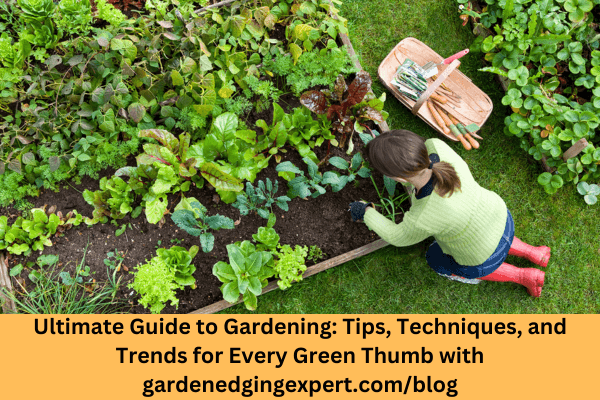Ultimate Guide to Gardening with gardenedgingexpert.com/blog

It is way more than just a hobby: reconvene with nature, boost sustainability, and enrich domestic surroundings by embracing gardening. Be it for a first-timer or an experienced thumb, the art form can be quite rewarding and fruitful once one goes into the world of gardening. We are going to talk in length about various essentials in gardening, some innovative trends, and expert tips, thereby helping you create your version of a lush paradise.
For more gardening inspiration and expert advice, check out the resources at gardeningexpert.com/blog, full of helpful information for all levels of gardeners.
Table of Contents
- Introduction to Gardening
- Gardening for Beginners
- Soil Types and Preparation
- Essential Gardening Tools
- Seasonal Gardening Tips
- Organic Gardening Practices
- Common Gardening Mistakes and How to Avoid Them
- Gardening Trends to Watch in 2024
- Conclusion: Your Next Steps in Gardening
Introduction to Gardening
It is one of the most popular hobbies in the world, offering numerous advantages. It is a very rewarding fact that you are raising something with your own hands, starting from food to therapeutic feelings because of being outside.
In the most minimal of definitions, it is the raising of plants in an artificial environment. It can range from a single small pot on a balcony to a large yard full of vegetables, flowers, and herbs. Gardening, be it on a small or large scale, encourages mindfulness, patience, and creativity.
Why Gardening Matters:
- Health benefits: stress reduction, improved mental health, and promotion of physical activity.
- Sustainability: Growing your own produce reduces your carbon footprint.
- Aesthetic appeal: Gardens are a beauty to behold, beautify your home from the curb appeal perspective.
- Environmental benefits: Gardens generally purify the air, giving room for biodiversity and adding to the local ecosystem.
To further discuss the issues related to why gardening is indispensable to having a healthier lifestyle, read in-depth guides at gardeningexpert.com/blog.
Gardening for Beginners
First-time gardening can be an intimidating process, but anyone can be a successful gardener with the right knowledge. Whether you are planting in containers, raised beds, or directly into the ground, the following key steps will start you on the road to success.
Some Basic Steps to Begin Gardening:
- Choose the Right Location: Most plants prefer and thrive in 6-8 hours of sun each day.
- Choose the Right Plants: Choose plants according to climate and growing season.
- Soil Preparation: For any plant to grow well, it needs rich and well-drained soil. Planting: Plant varieties of plants that require spacing. This will ensure that the plants grow really well. Watering: Overwatering can be prevented by checking on the moistness of the soil. Plant small-the smaller your garden, the more manageable it is. You want the best possible start. Grow plants that will make you feel like a rockstar, like tomatoes, herbs, or sunflowers. These friendly first-time crops offer instant gratification, growing rapidly with the bare minimum in maintenance.
For further beginner garden tips and for plant suggestions, visit: gardeningexpert.com/blog.
Soil Types and Their Preparation
Soil is the backbone of a successful garden; knowing what kind of soil you have will go a long way in making your gardening venture successful. There are mainly three kinds of soil: sandy, clay, and loamy; each is different in its particular characteristics, which determine the water retention, drainage, and nutrient availability.
Knowing Your Soil Type:
- Sandy soil: It is well-draining but doesn’t retain nutrients.
- Clay soil: Although it retains nutrients quite well, it mostly has poor drainage.
- Loamy Soil: A balance of sand, silt, and clay gives the best support to most plants.
- Soil Preparation Tips
- Test the pH: Most plants will do well in soil pH, ranging from 6.0 to 7.5.
- Adding Compost: Organic matter such as compost is added to the soil since compost will enrich the soil with necessary nutrients.
- Mulch your garden: This helps retain moisture in the soil, suppress the growth of weeds, and sustains a consistent temperature in the soil.
For the detailed guide on how to test your soil and how to improve the health of the soil, see more at gardeningexpert.com/blog.
Basic Gardening Tools
Gardening requires certain tools. Acquiring good quality and durable tools related to gardening can make the job easier and fun.
All Gardeners Must Have These:
- Trowel – For digging small holes, transplanting.
- Pruners – Very important for trimming plants to keep them healthy.
- Garden gloves – Save your hands from thorns and rough materials.
- Watering can/hose – Give water to your plants, but don’t drown them.
- Garden fork – Clears air pockets in soil, loosens soil, and pulls weeds.
For more detailed tool recommendations, including where to find them, check out gardeningexpert.com/blog.
Seasonal Gardening Tips
Each season brings its own challenge and, with that, its own opportunity when it comes to gardening. If you want to get the most out of your garden, you’re going to want to know a few simple seasonal gardening tips.
Spring Gardening Tips:
- Soil preparation, clean up garden bed
- Start seeds indoors or directly in the ground, cool-weather crops such as lettuce and peas
Summer Gardening Tips:
Water continually over the summer months, watching plants don’t get too dry during very hot periods.
Mulch heavily to retain moisture and reduce weeds.
Fall Gardening Tips:
- Pick late crops of pumpkins, squash, and so on.
Put in cover crops to build soil over winter. - Winter Gardening Tips
- Cover perennials with a frost blanket or mulch.
- Plan out your garden design and order seeds for spring.
- Find more thorough seasonal checklists at gardeningexpert.com/blog.
Organic Gardening Methods
Organic gardening doesn’t use chemical fertilizers, pesticides, or herbicides, and thus nurtures healthy plants while allowing a more balanced ecosystem to thrive in your garden.
Best Organic Gardening Methods:
- Composting: Compost your kitchen scraps into nutritious compost for your garden.
- Natural pest control: Use beneficial insects such as ladybugs, and spray organic solutions.
- Crop rotation: Change your crops season by season so the nutrients in the soil don’t get depleted and to avoid pest manifestation as much as possible.
Learn how to create a natural, low-chemical garden at gardeningexpert.com/blog.
Most Common Gardening Mistakes and How to Beat Them
Even the most seasoned gardener commits common mistakes. By avoiding common pitfalls, you can save time, money, and frustration.
Common Mistakes Gardeners Make:
- Overwatering or Underwatering: It’s all about finding that happy medium.
- Planting too close together: Plants growing too close to one another fight for nutrients and light.
- Not caring for soil health: Healthy soil is the foundation of a good, productive garden.
For more tips on how to solve such issues, check out expert solutions at gardeningexpert.com/blog.
Gardening Trends to Watch in 2024
The world of gardening never stands still; each new year heralds new technologies, new practices, and designs. Here are just a few to watch for in 2024:
Top Trends:
- Vertical gardening – Good for towns, vertical gardening grows plants upwards instead of out, allowing for maximum space in urban environments.
- Smart gardening: autonomous irrigation systems, app-driven gardens. For the tech-savvy gardeners, this is increasingly the way to go.
- Native plants: plant indigenous plants, support local wildlife, and help with water consumption.
Want to stay informed of what’s happening in the world of gardening? Subscribe for updates at gardeningexpert.com/blog.
Conclusion: Your Next Steps in Gardening
Gardening is a journey of discovery, and there is always something new to be learned by the novice or honing professional. Take a thoughtful, informed approach, and you can create a truly thriving garden that will continue to reward beauty, sustenance, and satisfaction for many years to come.
For more in-depth guides, tutorials, and community advice, check out gardeningexpert.com/blog. Your garden adventure starts here!





